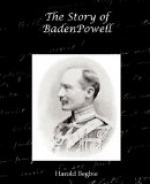It was shortly after the successful performance of The Pirates of Penzance, and after the evacuation of Kandahar, that Baden-Powell very nearly succeeded in putting an end to himself. He was toying with a pistol, in the firm conviction that it was unloaded, when, to his intense indignation, the thing went off and planted a bullet in the calf of his leg. It might have been a more romantically dangerous wound, but it was quite sufficiently uncomfortable. Even now, on any serious change in the weather, B.-P. is unpleasantly reminded of this adventure in far Afghanistan by rebellious throbbing in the old wound.
On his return from Kandahar Baden-Powell was appointed Adjutant and Musketry Inspector to his regiment, and he is spoken of by one who was himself adjutant of this fine regiment for many years as one of the best adjutants in the world. Shortly after this his uncle, General Smyth, Commandant at Woolwich, offered him the tempting appointment of A.D.C., but Baden-Powell preferred India and his regiment, and declined. Life in India suited Master Ste. It provided him with a great deal of real soldiering, much sport, and made him acquainted with one of the most fascinating countries in the world. After he got his troop, he became Brigade-Major to Sir Baker Russell’s Cavalry Brigade at Meerut Camp of Exercise, and was appointed Station Staff-Officer and Cantonment Magistrate at Muttra. With all these duties he found time for sketching and writing, publishing Reconnaissance and Scouting, and sending many interesting sketches to the Graphic. It may not be out of place here to mention that Baden-Powell, among other parts, has played the War Correspondent, working once in that character for the Daily Chronicle, and with considerable success.
That Baden-Powell was a marked man early in his career is attested by the fact of his being chosen as a member of the Board for formulating Cavalry regulations at Simla in 1884. He was eminently a business-man, a managing man, and all his work in the army has been marked by those excellent qualities which go to the making of our great merchant princes. He is shrewd, practical, and what he says is always to the point. His despatches are admirable examples of what such documents should be, never saying a word too much, and yet leaving his meaning clear-cut and unmistakable. For such work he finds a model in the despatch of Captain Walton, who, under Admiral Byng, destroyed the entire Spanish fleet off Passaro: “Sir,—We have taken or destroyed all the Spanish ships on this coast; number as per margin.—Respectfully yours, G. Walton, Captain.” Says Baden-Powell, “There is no superfluous verbosity there.”




